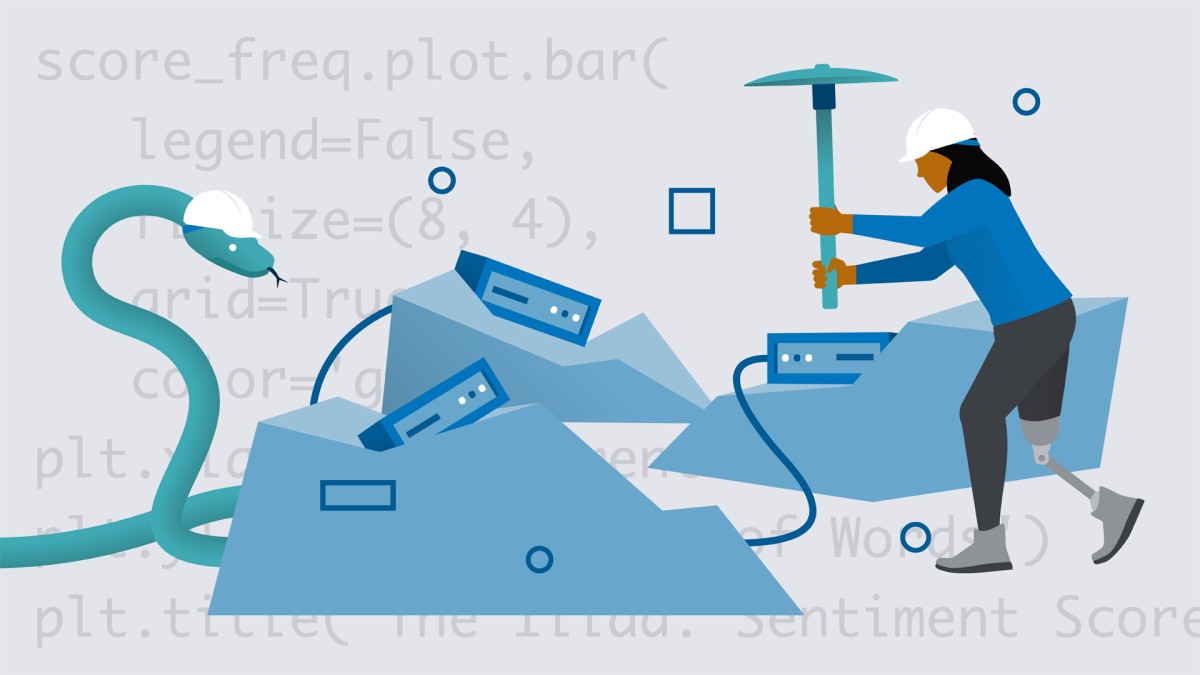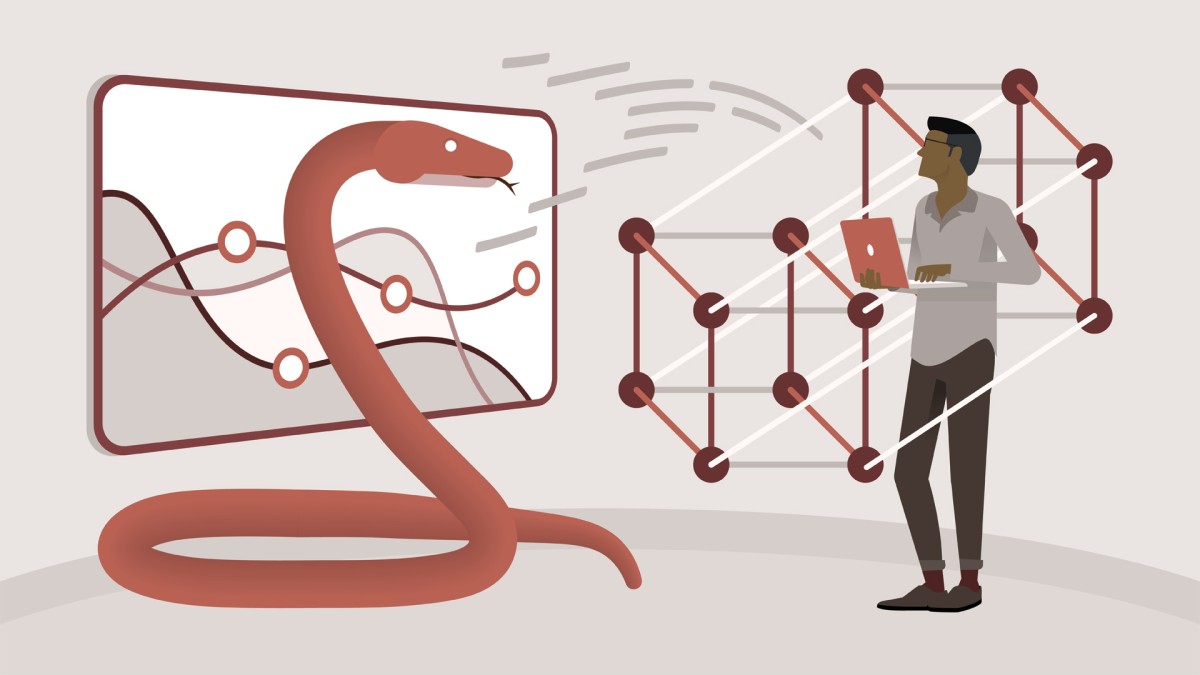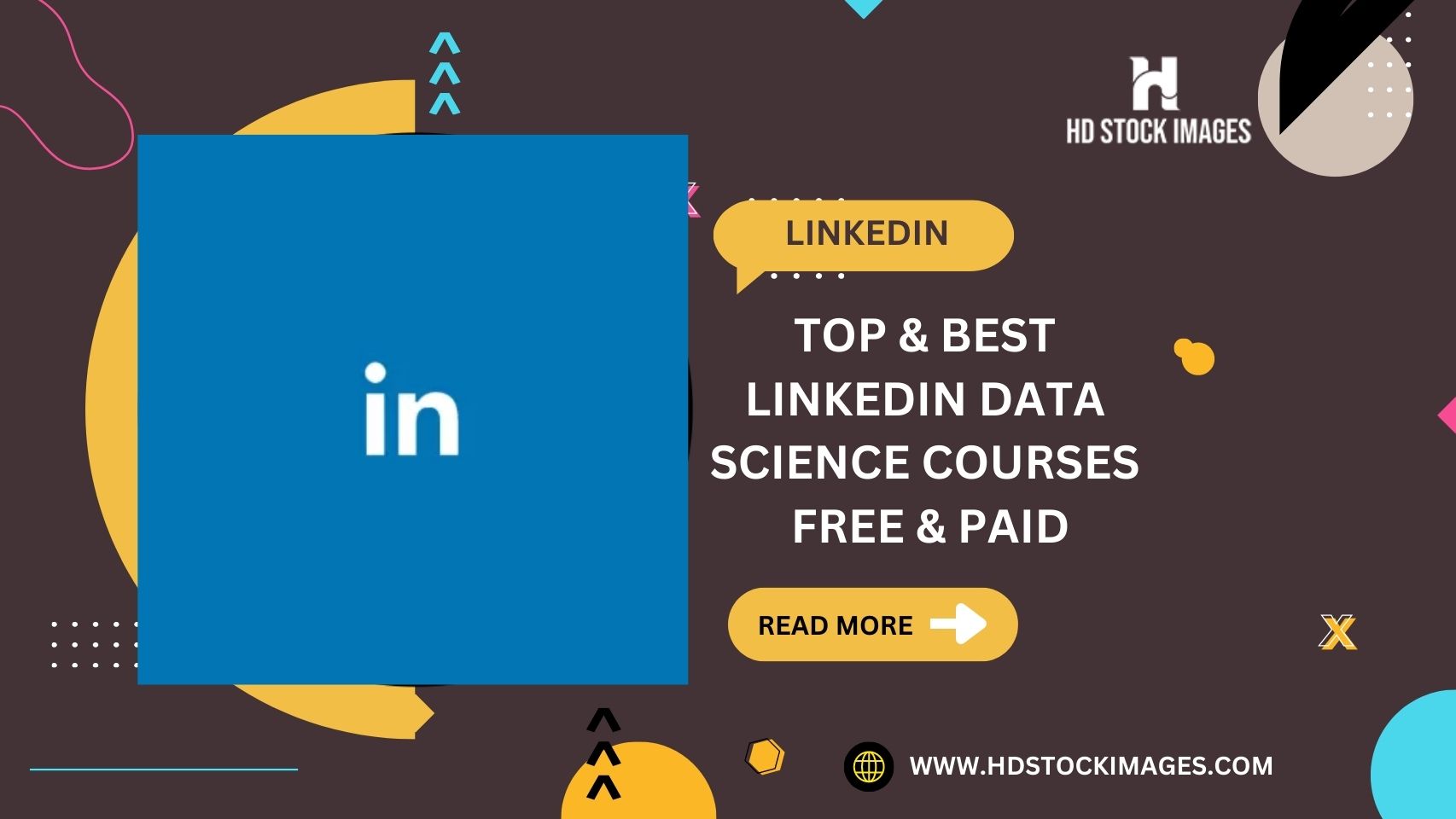Introduction:
Are you looking to enhance your data science
skills on LinkedIn? Look no further!
LinkedIn offers a wide range of top-notch data science courses, both free and paid, to suit your learning preferences and budget. Whether you're a beginner or an experienced professional, these courses provide comprehensive and cutting-edge content, covering topics such as machine learning, data visualization, and statistical analysis.With instructors who are industry experts, practical exercises, and valuable
networking opportunities,
LinkedIn's data science courses empower you to acquire the knowledge and expertise needed to excel in this rapidly growing field. So, dive in and take advantage of the best
LinkedIn data science courses available to propel your career forward.
List of Free Linkedin Data Science Courses:
- Data Science Foundations: Fundamentals
- Data Science Foundations: Data Mining
- Data Science Foundations: Machine Learning with Python
 Data Science Foundations: Fundamentals
Data Science Foundations: Fundamentals is a
free course on LinkedIn Learning that provides an accessible, nontechnical overview of the field of data science. The course covers the vocabulary, skills, jobs,
tools, and techniques of data science. It also defines the relationships to other data-saturated fields such as machine learning and artificial intelligence.
The course is taught by Barton Poulson, a data scientist and educator with over 20 years of experience. Poulson takes a practical approach to the material, and he uses real-world examples to illustrate the concepts.
The course is divided into six modules:
- Introduction to Data Science
- The Data Science Venn Diagram
- The Data Science Pathway
- The CRISP-DM Model in Data Science
- Roles and Teams in Data Science
- The Role of Questions in Data Science
Each module includes a series of video lectures, quizzes, and hands-on exercises. The exercises use open-source tools such as Python and R, so you can learn by doing.By the end of the course, you will have a solid understanding of the fundamentals of data science. You will also be able to use Python and R to analyze data and draw insights.
Some of the key takeaways from the course:
- Data science is a field that uses data to solve problems.
- Data scientists need to have a strong understanding of statistics, machine learning, and programming.
- There are many different types of data science jobs, such as data analyst, data engineer, and machine learning engineer.
- The CRISP-DM model is a popular methodology for data science projects.
- Data science teams typically consist of data scientists, data engineers, and business analysts.
- The role of questions in data science is to identify the problems that need to be solved.

Data mining is a process of extracting knowledge from data. This knowledge can be used to solve a wide variety of problems, such as fraud detection, customer segmentation, and product recommendation.There are many different types of data mining algorithms, each with its own strengths and weaknesses. Some common algorithms include clustering, classification, association rule mining, and text mining.Python and R are two popular programming languages for data mining. These languages provide a variety of libraries and tools that can be used to implement data mining algorithms.It is important to consider the ethical implications of data mining before using it. Data mining can be used to invade people's privacy or discriminate against certain groups of people.The course begins with an overview of
data mining, including its history, definition, and applications. It then discusses clustering algorithms, which are used to group data points together based on their similarities. Classification algorithms, which are used to predict the class of a data point, are then discussed.
 Machine learning with Python
Machine learning with Python is a great way to learn the basics of machine learning and how to use it to solve real-world problems. Python is a powerful programming language that is easy to learn and use, and it has a wide range of machine learning libraries and frameworks available.
Some of the benefits of learning machine learning with Python:
- Python is a versatile language that can be used for a variety of tasks, including machine learning.
- Python has a large and active community of developers who are constantly creating new libraries and frameworks for machine learning.
- Python is relatively easy to learn, even for beginners.
- There are many free resources available to help you learn machine learning with Python.
If you are interested in learning machine learning, Python is a great language to start with. There are many resources available to help you get started, and the language is relatively easy to learn. Once you have a basic understanding of Python, you can start exploring the many machine learning libraries and frameworks that are available.
Some of the most popular machine learning libraries for Python:
- Scikit-learn: Scikit-learn is a comprehensive machine learning library that includes a wide range of algorithms for supervised and unsupervised learning.
- TensorFlow: TensorFlow is a popular deep learning framework that is used for a variety of tasks, including image recognition, natural language processing, and speech recognition.
- PyTorch: PyTorch is another popular deep learning framework that is similar to TensorFlow.
- Keras: Keras is a high-level API that can be used with TensorFlow or PyTorch. It makes it easy to build and train neural networks.
Learning machine learning with Python can be a rewarding experience. It is a powerful tool that can be used to solve a variety of problems. With a little effort, you can learn the basics of machine learning and start using it to create your own applications.
List of Paid Courses:
- IBM Data Science Professional Certificate
- Dataquest Data Science Path
- Galvanize Data Science Boot Camp
 The IBM Data Science Professional Certificate
The IBM Data Science Professional Certificate is an
online program offered by IBM on the Coursera platform. It is designed to provide learners with a comprehensive understanding of data science
tools, techniques, and methodologies. The certificate program consists of a series of courses that cover various aspects of data science, including data analysis, machine learning, data visualization, and more. Here is an overview of the certificate program:The IBM Data Science Professional Certificate consists of nine courses, which are as follows:
- What is Data Science?
- Open Source tools for Data Science
- Data Science Methodology
- Python for Data Science and AI
- Databases and SQL for Data Science
- Data Analysis with Python
- Data Visualization with Python
- Machine Learning with Python
- Applied Data Science Capstone
2. Course content: Each course in the program covers specific topics related to data science. The courses provide hands-on experience and practical exercises using
tools and technologies commonly used in the field. Learners work on real-world projects and gain skills in areas such as data manipulation, data exploration, statistical analysis, machine learning algorithms, data visualization, and more.
3. Learning platform: The courses are delivered through the Coursera platform, which provides a user-friendly interface for accessing course materials, lectures, quizzes, and assignments. Learners can complete the courses at their own pace and have the option to earn a verified certificate upon successful completion of each course.
4. Instructors: The courses are developed and taught by data science experts and instructors affiliated with IBM. These instructors have practical industry experience and provide valuable insights and guidance throughout the program.

Dataquest Data Science Path is a comprehensive
online learning program that teaches you the skills you need to become a data scientist. The path is divided into 5 steps, each of which covers a different area of data science:
- Step 1: Foundations
- This step covers the basics of data science, including statistics, machine learning, and data visualization.
- Step 2: Data Analyst
- This step teaches you how to use Python to analyze data. You will learn how to clean, wrangle, and visualize data.
- Step 3: Data Scientist
- This step teaches you how to build machine learning models. You will learn about different types of machine learning algorithms and how to apply them to real-world problems.
- Step 4: Deep Learning
- This step teaches you about deep learning, a type of machine learning that uses artificial neural networks to learn from data.
- Step 5: Career Development
- This step teaches you how to land a job as a data scientist. You will learn how to build your portfolio, network with other data scientists, and interview for data science jobs.
Each step in the path includes a series of courses, guided projects, and hands-on exercises. You will also have access to Dataquest's community of data scientists, who can help you with your learning.
Some of the benefits of taking Dataquest Data Science Path:
- Comprehensive: The path covers all the essential skills you need to become a data scientist.
- Hands-on: The path includes a series of courses, guided projects, and hands-on exercises. This will help you solidify your learning and prepare you for a career in data science.
- Community: You will have access to Dataquest's community of data scientists, who can help you with your learning.
- Career development: The path includes a step on career development, which will teach you how to land a job as a data scientist.
If you are serious about learning data science and want to prepare yourself for a career in the field,
Dataquest Data Science Path is a great option.

Galvanize Data Science Boot Camp is an immersive program that teaches students the skills they need to become data scientists. The program is offered in both full-time and part-time formats, and it covers a wide range of topics, including:
- Machine learning
- Data visualization
- Big data
- Natural language processing
- Cloud computing
- Curriculum: The curriculum is designed to be hands-on and practice-oriented. Students will work on a variety of projects, and they will have the opportunity to interact with experienced data scientists.
- Instructors: The instructors at Galvanize are experienced data scientists who are passionate about teaching. They are committed to helping students succeed, and they provide one-on-one support throughout the program.
- Career support: Galvanize offers career support services to help students land their dream jobs. These services include resume reviews, mock interviews, and networking opportunities.
- Cost: The cost of Galvanize Data Science Boot Camp varies depending on the format and location of the program.
- Outcomes: Galvanize Data Science Boot Camp graduates have a high rate of job placement. In fact, 90% of graduates report being employed within six months of completing the program.
Overall,
Galvanize Data Science Boot Camp is a great option for students who are serious about a career in data science. The program is rigorous but rewarding, and it offers students the skills and support they need to succeed. However, the cost of the program and the time commitment required may be barriers for some students.
FAQ:
Q1: What are the top 3 free LinkedIn Data Science courses?ANS: Data Science Foundations: Data Mining is a free course that teaches you the fundamentals of data mining. The course covers topics such as clustering, classification, association rule mining, and text mining.
- Data Science Foundations: Data Visualization is a free course that teaches you the basics of data visualization. The course covers topics such as choosing the right data visualization, creating effective data visualizations, and communicating with data visualizations.
- Data Science: A Practical Introduction is a free course that teaches you the basics of data science using real-world case studies. The course covers topics such as data cleaning, data analysis, and machine learning.
Q2: What are the top 3 paid LinkedIn Data Science courses?ANS: IBM Data Science Professional Certificate is a nine-course program that covers the fundamentals of data science, including data mining, machine learning, and statistical analysis.
- Data Science: Complete Data Science Bootcamp is a comprehensive course that covers all aspects of data science, from data cleaning to machine learning.
- Data Science with Python: Master the Tools and Techniques is a course that teaches you how to use Python for data science. The course covers topics such as data analysis, machine learning, and natural language processing.
Q3: What are the benefits of taking a LinkedIn Data Science course?ANS: Learn from industry experts: LinkedIn Data Science courses are taught by experienced data scientists who work in the field. This means that you will learn from the best in the business.
- Get hands-on experience: Many LinkedIn Data Science courses include hands-on projects that allow you to practice your skills. This is a great way to build your portfolio and showcase your skills to potential employers.
- Earn a professional certificate: Some LinkedIn Data Science courses allow you to earn a professional certificate upon completion. This can help you to stand out from other job applicants and advance your career.
Q4: What are the prerequisites for taking a LinkedIn Data Science course?ANS: The prerequisites for taking a LinkedIn Data Science course vary depending on the specific course. However, most courses require some basic knowledge of mathematics, statistics, and programming.
Q5: How much does it cost to take a LinkedIn Data Science course?ANS: The cost of taking a LinkedIn Data Science course varies depending on the specific course. However, most courses cost between $50 and $200.
CONCLUSION:
In conclusion, LinkedIn offers a wealth of top and best data science courses, both free and paid, that cater to individuals at various skill levels and budgets. These courses equip learners with the necessary skills and knowledge in data science, covering essential topics such as machine learning, data visualization, and statistical analysis.With expert instructors, practical exercises, and networking opportunities, LinkedIn's data science courses are an excellent resource for those looking to advance their careers and stay ahead in this rapidly evolving field.
 Data Science Foundations: Fundamentals is a free course on LinkedIn Learning that provides an accessible, nontechnical overview of the field of data science. The course covers the vocabulary, skills, jobs, tools, and techniques of data science. It also defines the relationships to other data-saturated fields such as machine learning and artificial intelligence.
Data Science Foundations: Fundamentals is a free course on LinkedIn Learning that provides an accessible, nontechnical overview of the field of data science. The course covers the vocabulary, skills, jobs, tools, and techniques of data science. It also defines the relationships to other data-saturated fields such as machine learning and artificial intelligence.
 Machine learning with Python is a great way to learn the basics of machine learning and how to use it to solve real-world problems. Python is a powerful programming language that is easy to learn and use, and it has a wide range of machine learning libraries and frameworks available.
Machine learning with Python is a great way to learn the basics of machine learning and how to use it to solve real-world problems. Python is a powerful programming language that is easy to learn and use, and it has a wide range of machine learning libraries and frameworks available. The IBM Data Science Professional Certificate is an online program offered by IBM on the Coursera platform. It is designed to provide learners with a comprehensive understanding of data science tools, techniques, and methodologies. The certificate program consists of a series of courses that cover various aspects of data science, including data analysis, machine learning, data visualization, and more. Here is an overview of the certificate program:The IBM Data Science Professional Certificate consists of nine courses, which are as follows:
The IBM Data Science Professional Certificate is an online program offered by IBM on the Coursera platform. It is designed to provide learners with a comprehensive understanding of data science tools, techniques, and methodologies. The certificate program consists of a series of courses that cover various aspects of data science, including data analysis, machine learning, data visualization, and more. Here is an overview of the certificate program:The IBM Data Science Professional Certificate consists of nine courses, which are as follows:


 admin
admin








